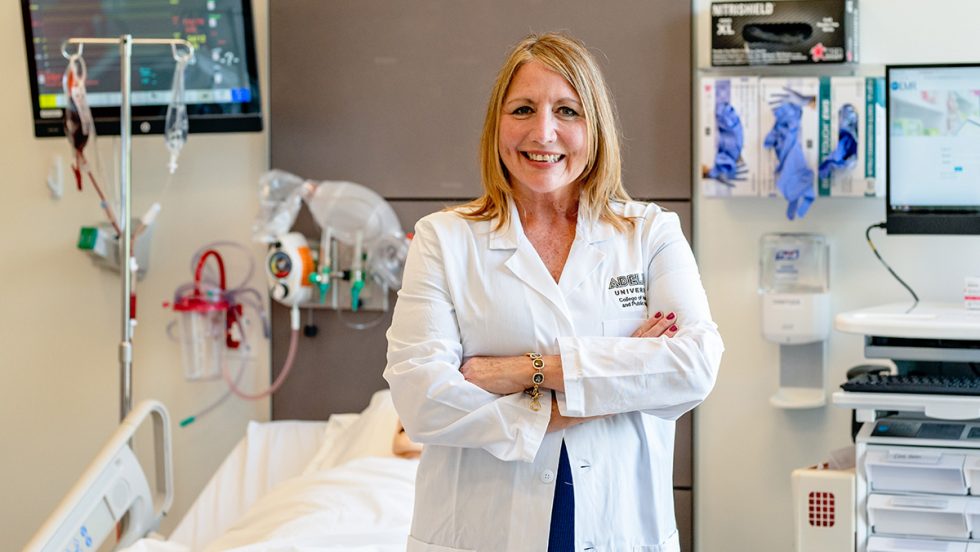
During a May 11 webinar titled “Putting the Pieces Together for Safe, Effective Care,” College of Nursing and Public Health (CNPH) Dean Deborah Hunt, PhD ‘12, said that patient safety and quality of care are integral to positive patient outcomes in all healthcare settings but cautioned that adverse events are still occurring at what she called a “pretty alarming” rate.
The webinar focused on major causes for these adverse events and, as Dean Hunt’s book subtitle put it, on “how to decrease medical errors and improve patient outcomes.” It was presented live from the dean’s Nexus Building office on Adelphi’s Garden City, New York, campus by Springer Publishing as part of its promotion of her fourth book, published in 2022, Fast Facts for Patient Safety in Nursing.
Dean Hunt said that “250,000 [patients’] lives are lost per year due to medical errors, … the third leading cause of death in the U.S.” Later, she noted that not everyone agrees with that [estimate].”
As of June 29, 2023, nearly 200 viewers so far have watched her webinar, including the original held at Adelphi University and the video posted on Springer Publishing and on YouTube at by Springer.
After some improvements since 1999, “error rates started to grow again” a couple of years ago, aggravated by the COVID-19 pandemic. That reversal inspired her to write her latest book, she said. Later, she noted that pandemic-related burnout from staffing shortages and other staffing issues have played a significant role in boosting mistakes that threaten patient safety. That, she noted, involves not just nurses but healthcare staff in general.
It’s not that the nursing and healthcare professions are not trying to stem this tide. There have been numerous patient safety initiatives proposed and implemented by various healthcare organizations, she said.
The Major Adverse Events
Still, Dean Hunt observed that just since she wrote her book, “hospital-acquired infections have risen to concerning levels,” especially since the pandemic. These often preventable infections involve catheters and staff ignoring handwashing or other hygiene practices, for example.
Other major adverse events, she said, include medication errors (which Dean Hunt cited twice as the sixth-leading cause of death), falls (1 million annually in hospitals) and pressure ulcers (also known as bedsores) at an “alarming” 2.5 million a year). Some of these are avoidable and preventable, while others are not, she said.
In reality, the picture is even bleaker. Dean Hunt emphasized, “Many errors are underreported.”
Dean Hunt also identified five common causes for such adverse events. These include: communication problems (including misunderstanding drug dosages and schedules), information flow (such as missing test results), not following established policies and procedures, patient-related issues (such as improper patient identification), and staffing problems.
Based on live polling she conducted during the session, Dean Hunt’s audience consisted primarily of faculty (64 percent), followed by RNs (27 percent), with students accounting for 5 percent and nurse practitioners and “other” rounding out the rest. When asked the most common cause of adverse events, 80 percent of participants chose miscommunication, while 10 percent each cited staffing issues and education.
How to Fight Back
Dean Hunt also offered strategies for improving the situation. The “attributes of a safe practitioner,” she said, include being educated about and committed to safety, being a patient advocate, dismissing shortcuts, and maintaining critical thinking and critical judgment practices.
“Care and do what’s right,” she advised. “Always take that extra step.” By practicing “mindfulness, presencing [the act of bringing yourself into the present moment] and self-care,” she added, nurses will stay focused on their patients’ well-being and avoid distractions from their hectic work schedule, for instance. “At the center is our patient.”
In addition, nurses must remember self-care for themselves and they must teach self-care to their patients as well, she said.
The best way to avoid errors? “Everybody needs to be a patient safety advocate,” Dean Hunt said, adding that there must also be clear policies and procedures in place and a commitment to a culture of safety.
Education and training must play key roles as well. During the Q&A portion, CNPH Clinical Assistant Professor Virginia Oates, DNP, asked if adverse events should play a bigger role in nursing students’ simulation lab scenarios conducted at the College and elsewhere. “A resounding yes!” Dean Hunt replied. “That’s vitally important … not just where I teach, but everywhere.” She also noted that “some hospitals have sim lab experiences” for their nursing staffs and she hoped that more would do so.